Participate in our upcoming centenary seminars at the UCL Department of Chemical Engineering. Below, you will find a lineup of our distinguished speakers.
Highlights of Centenary Seminar ""From Microreactors to Flow Chemistry to Sustainability: a 1/3-Centenary Path to Industry and Academic Community" 24 January 2024
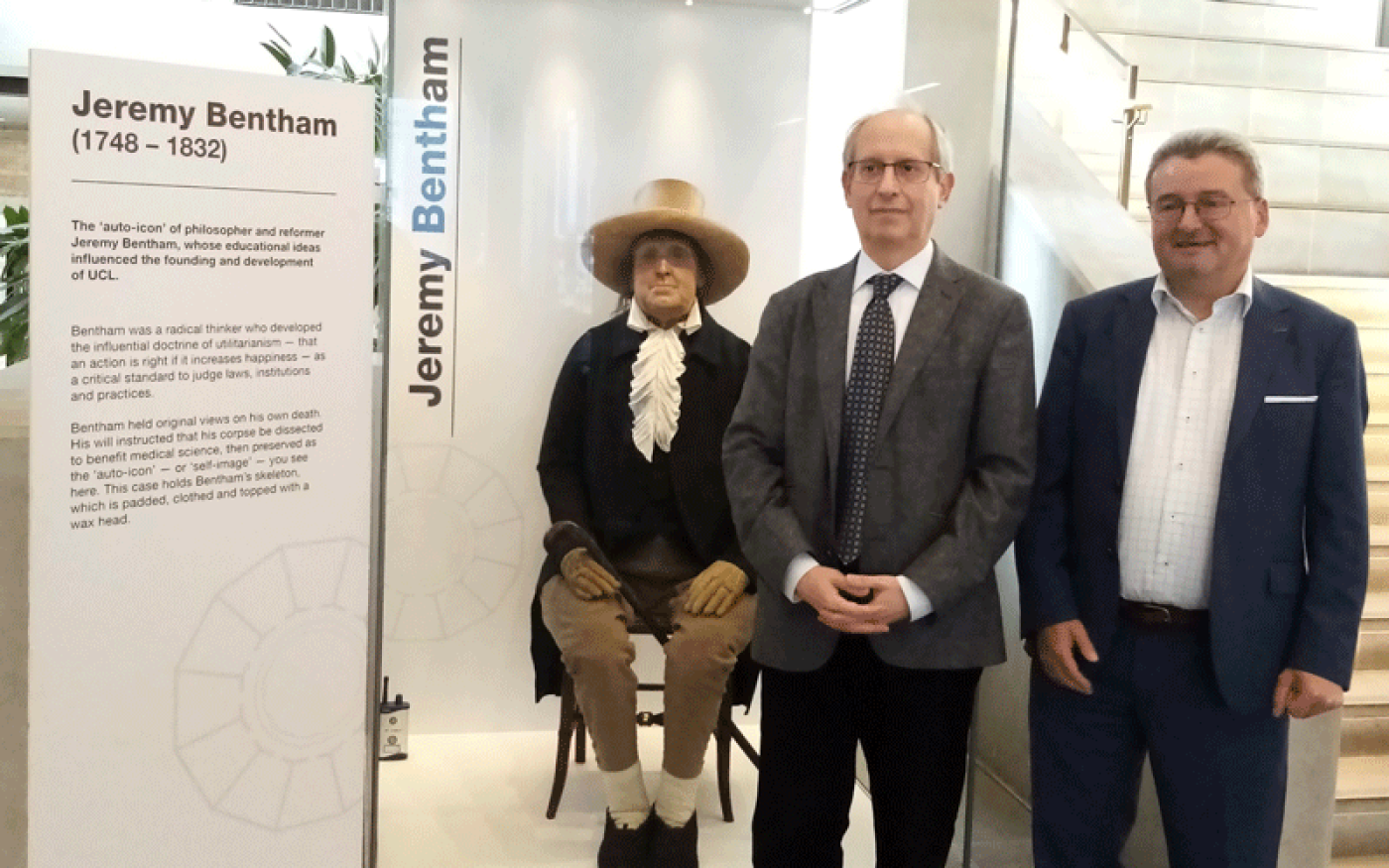
Photo of Prof Asterios Gavriilidis with Prof Volker Hessel in front of the Jeremy Bentham Auto-Icon.

Photo of Prof Volker Hessel presenting the centenary seminar: "From Microreactors to Flow Chemistry to Sustainability: a 1/3-Centenary Path to Industry and Academic Community".

Photo of Prof Asterios Gavriilidis presenting Prof Volker Hessel with a centenary seminar award in the Sir Ambrose Fleming Lecture Theatre.
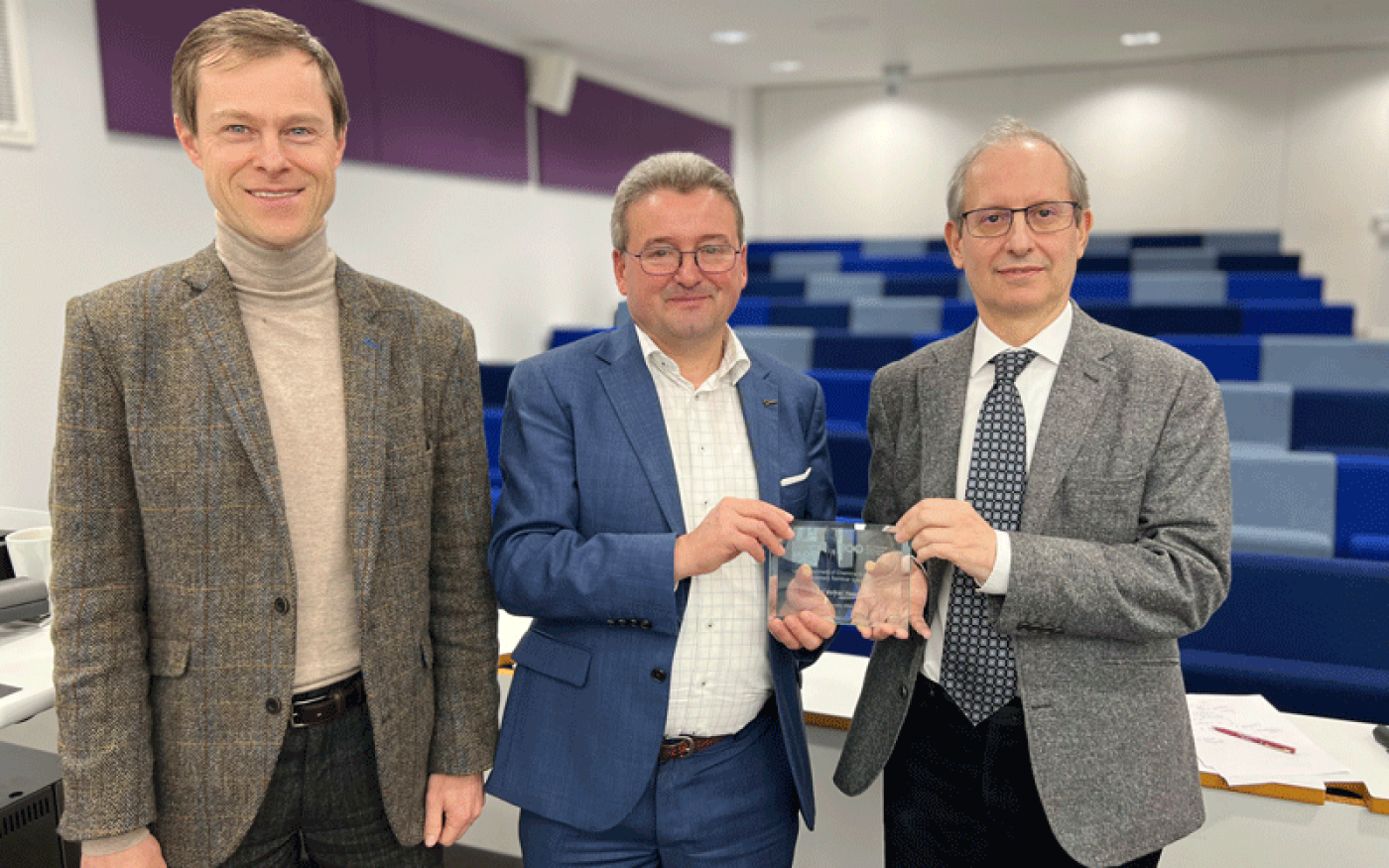
Photo of Prof Asterios Gavriilidis and Prof Marc-Olivier Coppens presenting Prof Volker Hessel with a centenary seminar award in the Sir Ambrose Fleming Lecture Theatre.

Photo of Head of Department, Prof Eva Sorensen and Prof Asterios Gavriilidis presenting Prof Volker Hessel with a centenary seminar award in the Sir Ambrose Fleming Lecture Theatre.

Close-up photo of Prof Volker Hessel's Centenary award.
Highlights of Centenary Seminar "Process Systems Engineering in the ChatGPT Era: What's Next?" by Professor Venkat Venkatasubramanian, 22 November 2023

Photo of Prof Venkat Venkatasubramanian with Head of Department, Prof Eva Sorensen in front of the Jeremy Bentham Auto-Icon.

Prof Venkat Venkatasubramanian presenting the Centenary seminar: Process Systems Engineering in the ChatGPT Era: Where do we go from here?

Head of Department, Prof Eva Sorensen presenting Prof Venkat Venkatasubramanian with a Centenary seminar award.

Close up of Prof Venkat Venkatasubramanian's Centenary seminar award.
Highlights of Centenary Seminar "Microgravity experiments for a better understanding and modelling of boiling phenomena" by Professor Catherine Colin, 8 February 2024
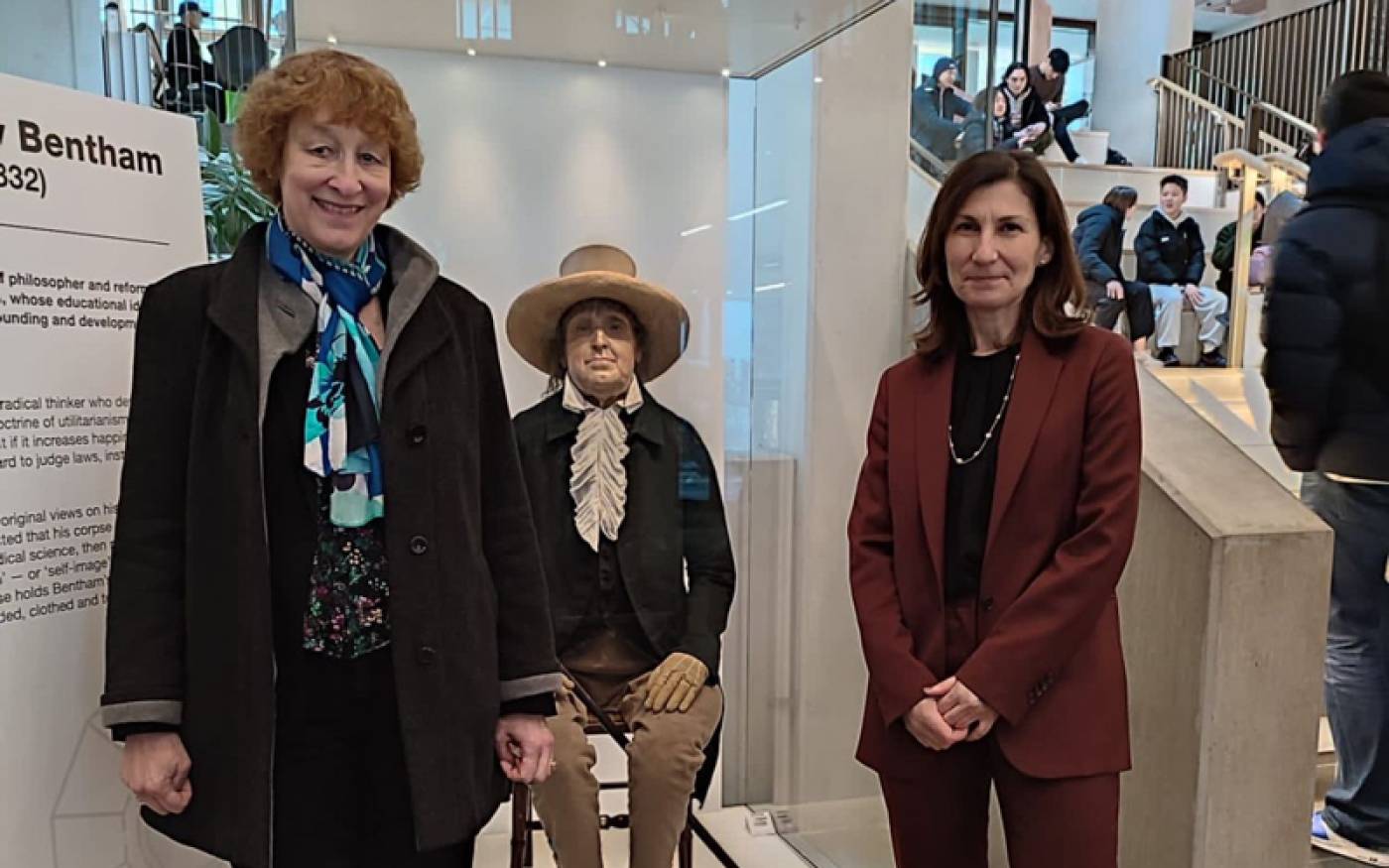
Photo of Prof Catherine Colin with Prof Panagiota Angeli in front of the Jeremy Bentham Auto-Icon.

Photo of Prof Catherine Colin presenting the centenary seminar: "Microgravity experiments for an improved understanding and modelling of boiling phenomena."

Photo of Prof Panagiota Angeli presenting Prof Catherine Colin with a centenary seminar award in the Sir Ambrose Fleming Lecture Theatre.

Photo of Prof Panagiota Angeli and Head of Department, Prof Eva Sorensen presenting Prof Catherine Colin with a centenary seminar award in the Sir Ambrose Fleming Lecture Theatre.

Close-up photo of Prof Catherine Colin's Centenary award.
- Prof Venkat Venkatasubramanian
Centenary seminar: Process Systems Engineering in the ChatGPT Era: Where do we go from here?
22 November 2023
15:00 - 17:00 - Speaker
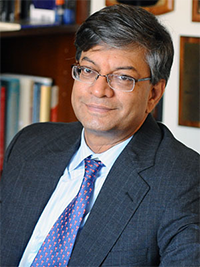
Prof Venkat Venkatasubramanian
Department of Chemical Engineering
Columbia University, USA
Centenary seminar: Process Systems Engineering in the ChatGPT Era: Where do we go from here?
Date: 22 November 2023
Time: 15:00 - 17:00Abstract
The startling success of ChatGPT and transformer-based generative neural networks in applications such as natural language processing and image synthesis has many researchers excited about the potential opportunities in process systems engineering (PSE). However, there is an essential difference between such applications and PSE. PSE is governed by fundamental laws of physics and chemistry (and biology), constitutive relations, and highly technical knowledge about materials, processes, and systems. While purely data-driven machine learning has its immediate uses, the long-term success of AI in scientific and engineering domains, I believe, would depend on leveraging first principles and technical knowledge effectively. ChatGPT’s “hallucinations” are perhaps interesting and amusing in certain applications, but they are potentially dangerous in highly technical domains such as PSE. In this talk, I will discuss these challenges and opportunities going forward.
Biography
Professor Venkat Venkatasubramanian is Samuel Ruben- Peter G. Viele Professor of Engineering in the Department of Chemical Engineering, Professor of Computer Science (Affiliate), and Professor of Industrial Engineering and Operations Research (Affiliate) at Columbia University. He earned his Ph. D. in Chemical Engineering at Cornell, M.S. in Physics at Vanderbilt, and B. Tech. in Chemical Engineering at the University of Madras, India. He taught at Purdue University for many years before returning to Columbia in 2011.
Venkat is a complex-dynamical-systems theorist interested in developing mathematical models of their structure, function, and behavior from fundamental conceptual principles. He considers himself an artist in science whose natural tendency is to conduct curiosity-driven research in a style that might be considered impressionistic, emphasizing conceptual issues over mere techniques. He strives to create a simplified but essentially correct model of the reality that he studies. Venkat's research interests are diverse, ranging from AI to systems engineering to theoretical physics to economics, but they are centered around the theme of understanding complexity and emergent behavior in different domains.
Venkat received the Norris Shreve Award for Outstanding Teaching in Chemical Engineering three times at Purdue University. He won the Computing in Chemical Engineering Award from AIChE and is a Fellow of AIChE. In 2011, the College of Engineering at Purdue University recognized his contributions with the Research Excellence Award. He is a past president of the CACHE Corporation. From 2009-19, he served as Editor for Computers and Chemical Engineering. His book, How Much Inequality is Fair? Mathematical Principles of a Moral, Optimal, and Stable Capitalist Society, was published in 2017. Three of his papers are among the ten most-cited papers in the 46-year history of Computers & Chemical Engineering. Venkat's other interests include comparative theology, classical music, and cricket.
- Prof Volker Hessel
Centenary seminar: From Microreactors to Flow Chemistry to Sustainability: a 1/3-Centenary Path to Industry and Academic Community
24 January 2024
15:00 - 17:00 - Speaker
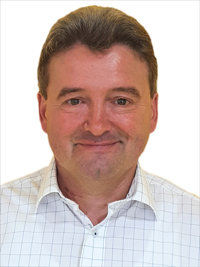
Professor in Sustainable Chemical Engineering
School of Chemical Engineering
Faculty of Sciences, Engineering and Technology
The University of Adelaide, AustraliaCentenary Seminar: From Microreactors to Flow Chemistry to Sustainability: a 1/3-Centenary Path to Industry and Academic Community
Date: 24 January 2024
Time: 15:00 - 17:00Abstract
Technology disruption can be a solution to a major societal or environmental challenge, to transform industries and redefine circularity. Covid has made us aware how critically it can be if global supply chains are interrupted, and we are coming back to resilient, self-sufficient and local manufacturing. The presentation will answer how flow chemistry (and plasma) processing can change chemical processing.
Microreactors have notably intensified mass and heat transfer and allowed safe operation in formerly explosive regimes. This was not enough to break through to chemical industry. Their expansion in process capability towards Novel Process Windows (NPW) was instrumental to widen their use in chemistry to what is known today as flow chemistry [1]. NPW utilises unusual, typically harsh process conditions to boost productivity of microreactors, and as a consequence, microreactors and flow chemistry have been used on industrial scale.
Recently, our group started space experimentation, as space is the ultimate disruptive barrier and modern playground for out-of-box thinking. Space manufacturing and resource utilization is the key to human space exploration and a revisit of the circular economy on Earth. Flow chemistry has been used for asteroid mineral processing and mooncrust phosphate/potassium leaching, an on-satellite self-priming chip for space chemistry, and the manufacture of nanoemulsions to form astronaut designer beverages and space medicines; with our first Australian-led ISS-NASA experiment motivating the latter.
The presentation will then overview (i) what sustainability assessments can deliver to guide flow chemistry towards industrial use, (ii) which types of sustainability assessment are at hand, and (iii) exemplify the potential of sustainability assessments at key examples. This includes green solvents, distributed manufacturing for on-demand customer supply, novel process windows, the 2010-Nobel Prize in Chemistry, and cost-internalization for a new chemical economy. We translated the principles of Environmental, Social and Governance (ESG), guiding investments for today’s companies, to evaluate a potential business of frontier technologies, which yet does not exist, looking forward 5-10 years.
Conclusion is that technology disruptions, while allowing breakthroughs in industrial challenges, also give new fundamental paradigms to the academic community.
Biography
Prof. Volker Hessel studied chemistry at Mainz University/D. 1994: Institut für Mikrotechnik Mainz/Germany (Director R&D); 2005: Professor Eindhoven University of Technology/NL; 2018: Deputy Dean (Research), Professor University of Adelaide, Australia; 2019: part-time professor University of Warwick/UK.
He is author of 627 peer-reviewed publications (h-index: 87; ca. 34,000 citations). He received the AIChE Excellence in Process Development Research Award, IUPAC ThalesNano Prize in Flow Chemistry. He is program lead in the ARC Centre of Excellence Plants for Space (P4S), and is Research Director of the Andy Thomas Centre for Space Resources. He received several EU’s research excellence grants (ERC Advanced/Proof of Concept/Synergy, FET OPEN). He was authority in a 35-teamed Parliament Enquete Commission "Future Chemical Industry”.
- Prof Catherine Colin
Centenary seminar: Microgravity experiments for a better understanding and modelling of boiling phenomena
8 February 2024
15:00 - 17:00 - Speaker
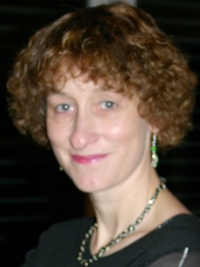
Prof Catherine Colin
University of Toulouse
Institute of Fluid Mechanics Toulouse, Allée de Professeur Camille Soula 31400 Toulouse, FRANCE
Centenary seminar: Microgravity experiments for a better understanding and modelling of boiling phenomena
Date: 8 February 2024
Time: 15:00 - 17:00
Location: Roberts Building, Room 106
This seminar is followed by a reception in Room 310S, Roberts Building.To register, email Melania Torok, Executive Assistant at chemeng.ea@ucl.ac.uk.
Abstract
Boiling is of significant importance to many technical processes and applications on earth and in space. It is a complex process since it involves various physical parameters which govern the heat and mass transfers. Despite the numerous correlations that exist, the prediction of boiling heat transfer remains difficult. For better modeling, it is therefore important to improve our understanding of local physical phenomena, such bubble growth and detachment of isolated bubbles. The continuous detachment of bubble due to buoyancy during boiling in terrestrial gravity condition complicates the investigation. Microgravity experiments are therefore relevant for observing larger bubbles on longer time scales. It is the objective of the Multiscale Boiling experiment RUBI designed for more than a decade by various European teams, under the framework of ESA (European Space Agency) Project BOILING. RUBI was operated on the International Space Station from 2019 to 2021. Experiments have been performed in pool boiling and in shear flow, both with and without the presence of electric field. The fluid used is a refrigerant N-perfluorohexane. Bubbles are nucleated on an artificial cavity located on a surface heated with heat flux from 0.5 to 1.5W/cm2. Different liquid subcooling up to 10°C and flow rates are investigated. High-speed Black and White camera records the images of the bubble growth and departure. The temperature field at the surface of the heated wall is measured by an infrared camera. We analyze the bubble growth, its departure from the nucleation site and its detachment from the wall. The bubble diameter evolves as the root mean square of the time, characteristic of a growth controlled by thermal diffusion. The bubble departure diameter by sliding along the wall is found to be well predicted by a balance between the drag force exerted by the flow and the capillary force acting at the contact line. After its departure, the bubbles slide along the heated wall and they detach from the wall after a coalescence mechanism which is known as coalescence-induced jumping bubble, similar to this observed for droplets in condensation.
Biography
Catherine Colin is Professor at the University of Toulouse and Researcher at the Institute of Fluid Mechanics in Toulouse (IMFT). She obtained her PhD in 1990 in Toulouse and joined IMFT as CNRS researcher. She became full Professor in 2002. Her main research topics are two-phase flow in normal and microgravity conditions, bubble dynamics, breakup and coalescence, turbulence modelling, pool and convective boiling. She is involved in several national and international networks and projects on two-phase flow for space applications and nuclear industry. She is authors of 150 publications in peer review journals or proceedings of international conferences and 15 keynotes lectures in international conferences. She was associated editor of Experimental Thermal and Fluid Science (2010- 2018) and is associated editor of International Journal of Multiphase flows. She was involved the scientific committees or co-chair of several international conferences (International Conference on Multiphase Flow, International Conference on Boiling and Condensation heat transfer, Experimental Heat Transfer Fluid Flow and Thermodynamics). She was vice Chair in charge of research at the Polytechnic National Institute of Toulouse (2016-2020).
- Prof Marco Mazzotti
Centenary seminar: The role of CCS and CDR in reaching net-zero
24 April 2024
15:00 - 17:00 Speaker
Prof Marco Mazzotti
Department of Mechanical and Process Engineering
Institute of Energy and Process Engineering
Separation Processes Laboratory
Centenary seminar: The role of CCS and CDR in reaching net-zeroDate: 24 April 2024
Time: 15:00 - 17:00
Location: Roberts Building, G06 Sir Ambrose Fleming Lecture Theatre.
This seminar is followed by a reception in Room 310S, Roberts Building.To register, email Melania Torok, Executive Assistant at chemeng.ea@ucl.ac.uk.
Abstract
While CCS and CDR are now acknowledged to be key components of a portfolio of measures to tackle climate change and to evolve towards a net-zero world, their deployment faces still several major hurdles. In this talk the opportunities provided by CCS and CDR, and the challenges that come along will be presented and discussed. As to the former, mineral carbonation, both in-situ and ex-situ, will be discussed together with the importance for researchers of moving from the laboratory to the field to demonstrate their new science. As to the latter, systemic challenges, socio-economic challenges, and political challenges will be addressed, to show that scientists and engineers must engage in the public arena as well, if they are motivated to make an impact with their innovative ideas.
Biography
Marco Mazzotti, an Italian and Swiss citizen born in 1960, married, with two children, has been professor of process engineering at ETH Zurich since May 1997 (associate until March 2001 and Full Professor thereafter). He holds a Laurea (MSc, 1984) and a Ph.D. (1993), both in Chemical Engineering and from the Politecnico di Milano, Italy. Before joining ETH Zurich, he had worked five years in industry (1985-1990), and had been Assistant Professor at the Politecnico di Milano (1994–1997).
He was coordinating lead author of the IPCC Special Report on CCS (2002-2005), President of the International Adsorption Society (2010–2013), chairman of the Board of the Energy Science Center of the ETH Zurich (2011-2017), and chairman of the Working Party on Crystallization of the EFCE (2014-2021). He was a contributor to the Nobel Peace Prize for 2007 awarded to the Intergovernmental Panel on Climate Change (IPCC). He was the recipient of an honorary doctorate from the Otto von Guericke University Magdeburg, Germany (2014). He has been awarded a European Research Council Advanced Grant towards „Studying secondary nucleation for the intensification of continuous crystallization“ (2018-2024). He was the recipient of the SINTEF and NTNU CCS Award 2021. He is member of the Swiss Academy of Engineering Sciences and the coordinator of the project DemoUpCARMA (Demonstration and Upscaling of Carbon Dioxide Management Solutions for a Net-Zero Switzerland).
As of October 2023, he has published about 450 papers that have been cited more than 25,000 times, resulting in an H-index of 85 (Google Scholar). Sixty-one doctoral students have graduated with him, and fourteen doctoral students are currently advised by him.
He was the chair of the 9th International Conference on Fundamentals of Adsorption FOA9 (Taormina, I, May 20–25, 2007), of the 18th International Symposium on Industrial Crystallization (Zurich, CH, September 15–16, 2011), and of the 2019 Gordon Research Conference on Carbon, Capture, Utilization and Storage (Les Diablerets, CH, May 5-10, 2019).
- Dr Jerry Barker
Centenary seminar: The Scale-up and Commercialization of some Advanced Battery Technologies
15 April 2024
15:00 - 17:00 Speaker
Dr Jerry Barker
CEO and Founder
Redoxion LimitedCentenary seminar: The Scale-up and Commercialization of some Advanced Battery Technologies
Date: 15 May 2024
Time: 15:00 - 17:00
Location: Roberts Building, G06 Sir Ambrose Fleming Lecture Theatre.This seminar is followed by a reception in Room 310S, Roberts Building.
To register, email Melania Torok, Executive Assistant at chemeng.ea@ucl.ac.uk.
Abstract
A review of the successful commercialization of several advanced battery technologies will be presented. This discussion will include details of Li-ion battery applications based on some well-known Li-CAMs, including LiFePO4, Li3V2(PO4)3, LiMn2O4 and LiVPO4F. The interest in LiFePO4 is going through something of a renaissance, and details will be provided describing the future opportunities for this active material to meet the growing global demand from various energy storage applications, including automotive.
An overview of the current commercial status of Na-ion batteries will be provided with particular emphasis given to the world-leading position of Faradion Limited. Na-ion batteries based on non-aqueous electrolytes represent an inexpensive and sustainable alternative to their Li-ion counterparts. Faradion is a UK-based company, founded in 2011, acquired by Reliance Industries Limited of India in late 2021.
Finally, an introduction to a new UK-based startup, Redoxion Limited will be provided. Redoxion is focussing on the sustainable and low-cost Li-CAM market.
Biography
Jerry Barker received his PhD in solid state electrochemistry from the University of Exeter. In his early career Jerry worked at BP and also spent time at UCSB where he collaborated and published with the Nobel prize winners Alan Heeger and Hideki Shirakawa on alkali metal doped polyacetylene. He is currently co-founder and CTO of Faradion Limited, a UK-based start-up company specializing in next generation Na-ion battery technology. Previously Jerry was Chief Scientist and Research Director at Valence Technology Inc. In May 2019, Jerry was appointed Honorary Professor within the School of Chemistry at the University of St. Andrews.
Jerry has published extensively in the energy storage area (h-index = 56, total number of citations >10,000) and is a named inventor on more than 120 issued US patents. Jerry is the inventor of a number of Na-ion and Li-ion active materials, including surface-stabilized LiMn2O4, Tavorite structured active materials, Na3V2(PO4)2F3, NaVPO4F, LiVPO4F, Li3V2(PO4)3, LiFe(Mg)PO4, as well as the Carbothermal Reduction (CTR) manufacturing method. To date, these inventions have culminated in 4 commercially successful battery enterprises and CTR is widely regarded as the benchmark, industry-standard method for the large-scale manufacture of LiFePO4.
In 2012, Jerry was awarded the IBA Technology Award for his contributions to Li-ion battery materials. He has appeared as a patent litigation expert witness in Europe and in North America. He has also acted as the due diligence technical expert for a number of VC-backed start-up companies. Jerry currently acts as an Expert Panel member for the UK’s Faraday Institution, as a Board Member of the UK Li-BATT consortium and serves on the advisory board for Australia’s storEnergy initiative.
 Close
Close

